Finegear founder Cristian Kreindler has introduced Mixerblocks, a new modular DIY analog mixing console that is designed so that it can grow and evolve, by adding channel strips and other ‘blocks’ to meed your needs.
The Mixerblocks series is a modular and expandable analog audio mixing console. A variable number of channel strips can be connected to a main I/O docking-block. Each channel-block can also have one or more extra-blocks connected to it, adding supplementary effect sends, returns or submix groups to the configuration.
Mixerblocks is also open hardware, licensed under a Creative Commons Attribution-ShareAlike 4.0 International License, so you can mod the design, build on the design, built compatible blocks and more.
Mixerblocks is designed to be a DIY project, and can be built with a choice of enclosures: MDF (as shown abover) or sheet metal. Most of the parts are SMD and already soldered on the PCBs, so all that’s left to assemble are the controls and a few through-hole parts, making it an easy DIY build.
A basic input channel is available for now, while other types of channels, such as tube preamps and passive equalizers, are planned. Inside each channel, the preamp and EQ boards are separate, allowing for various groupings. The current input channel is also designed to be compatible with the DiYRE Colour format.
Mixerblocks Features:
- With Mixerblocks, you can add channels to your console as needed, and tailor your mixer to meet your needs. Similarly, you can add new FX send/return buses for extra effects. You can also add submix buses to help better group your instruments.
- Mixerblocks allows routing the channel signals to effects and/or to any submix buses. The result can be then flexibly routed to the master outputs (left, right or both), processed through insert effects or connected to other devices through the individual outputs.
- The Mixerblocks concept includes the possibility to design different types of channels with varying features and sonic behaviors – different types of preamps or EQs come to mind. The mixing console can adapt to any particular need, by including a combination of channel types.
Pricing and Availability
- The Basic Channel Block is available now for 90€ (+20€ for the MDF case). Shipping in February 2018.
- The Main Docking Block is available now for 180€ (+30€ for the MDF case). Shipping in February 2018.
- The Extra Blocks series will follow shortly in March 2018.
See the Finegear site for more info.
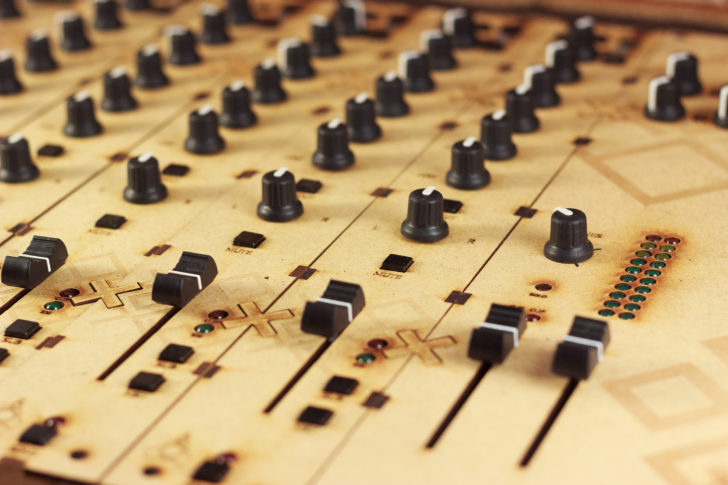
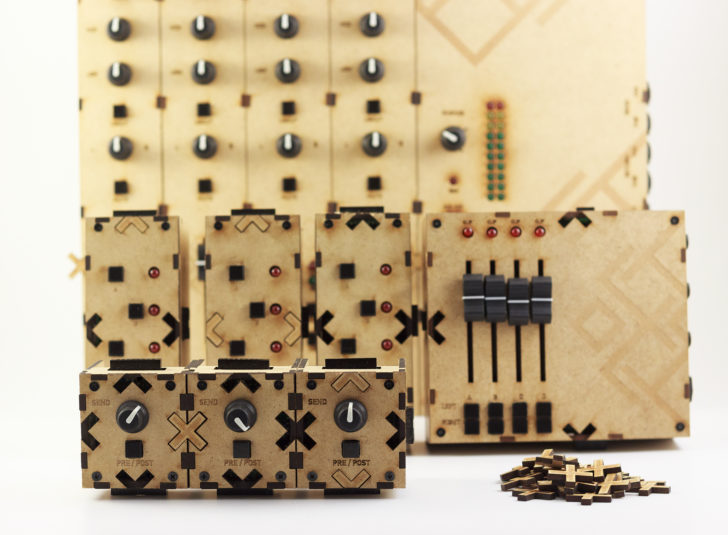
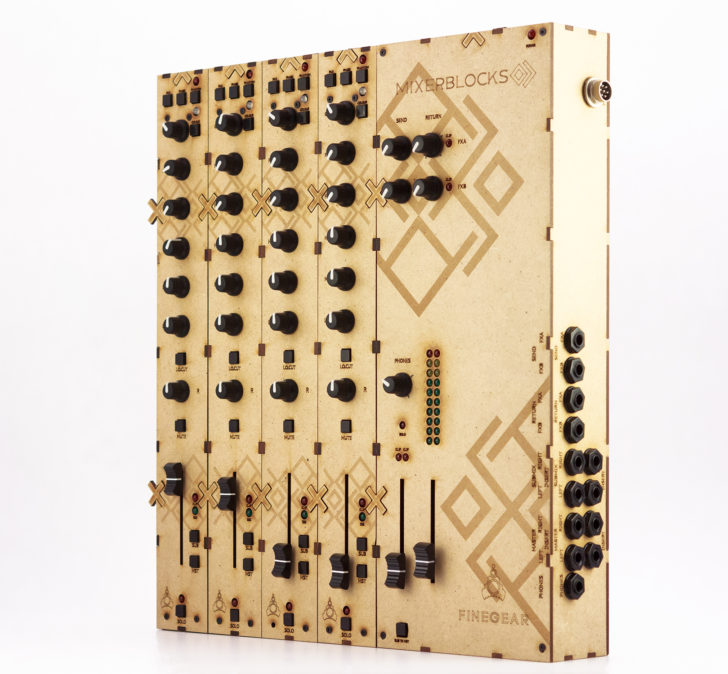

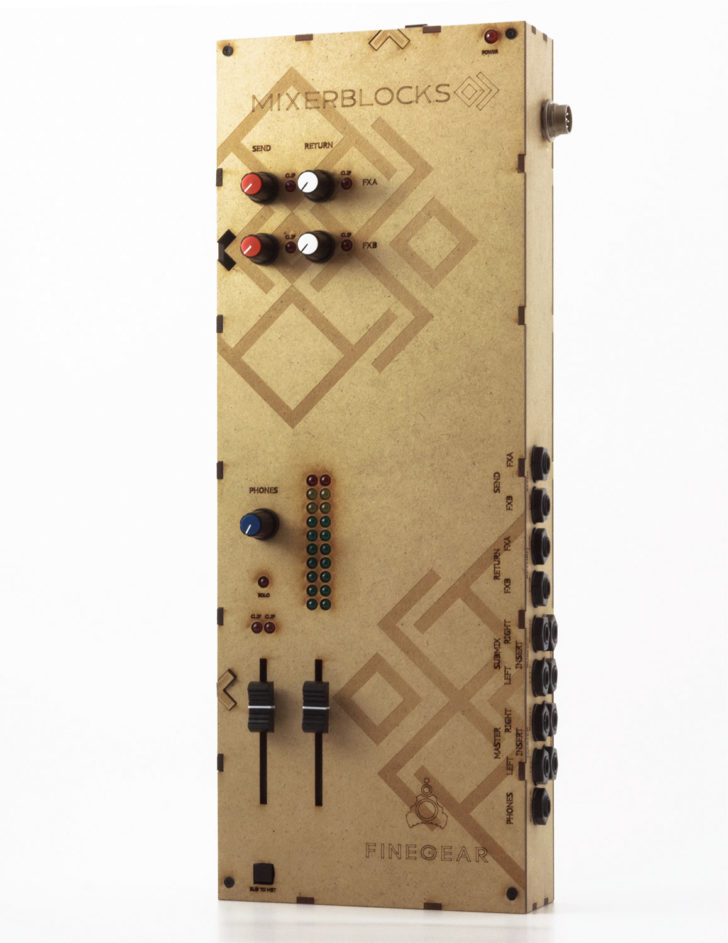
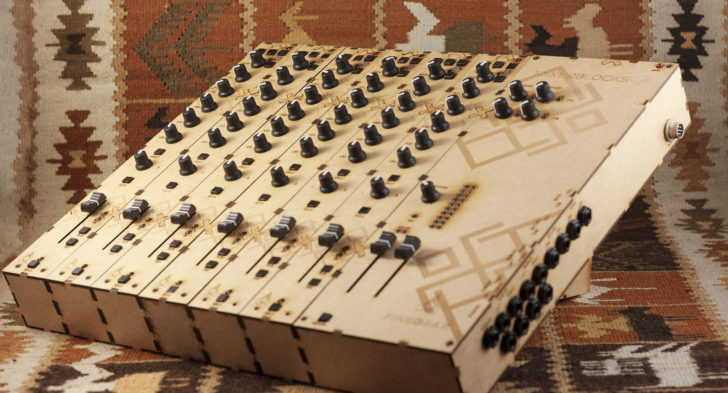

Looks cool. I don’t fully understand the specs, but they look good from what I know.
Fun idea!
That mixer would be over $1K, though, and it would be made of wood (and you would have to put it together yourself). You can buy a lot of small mixer for $1000.
Schertler has announced smaller modular mixers this NAMM.
Just looked into Schertler and those are some damn sexy components!!!
I’m all for DIY but I’m not sure this is going to be price competitive when you look at what you can get for less money from most of the major manufacturers.
This
DIY stuff is great … but Mackie 802 VLZ4 (8 channels) -199€ vs Mixerblocks (8 channels) – 1090€ !!
…i really hope i didnt get this right
Yeah… this is a great time to buy a humongous full featured high quality mixer with built in effects, multiple busses, USB interface, wireless, MIDI control, built in quadrophonic/surround output control, SD card recording, etc, etc, pretty much any feature combination you like, and would definitely be vastly less than the DIY route given the cited prices per channel.
Example, the 8 channel Mackie for $200 mentioned, but also Behringer has a 12 channel model with built in effects and a USB interface for $130. Or if you want full MIDI automation, quad output, and full interface automation, with a compressor on every channel, there’s the $600 k-mix. Or for the same price Zoom can set you up with 16 channels of input and SD card recording and effects on every channel…
So, great idea a modular DIY mixer, but, huh, I wonder how many they’ll sell. I think the basic problem here is small quantity boards are a lot more than high quantity boards. Also doing the ground and power planes and getting all the board layout is pretty critical for a mixer, and when it’s a total unknown, how is it really going to sound. We’ll see.
DIY stuff is great
but Mackie humongous high quality effects wireless SD card combination you like Behringer effects for $130. So, great idea, but, huh, I wonder I think total unknown.
Looks like a pizza box with knobs and sliders!
It’s a cool idea, kind of ugly and very expensive. Wonder what the cost would be for just the completed boards and no laser cut wood case…
The obsession with DIY and open source, while probably motivated by the best of intentions, doesn’t scale well to this type of project. As others have mentioned, this project would not be competitive on cost or features with a commercially-available mixer. Not even close.
The audience would be people who feel that they are getting a deal on something because it’s sold as an open-source DIY thing, but in the end you need countless hours, tools, materials, etc just to end up with something that is inferior to what you can buy at retail. All for what? The pride of saying, I built my own console? It’s fine if people want to play around in the garage tweaking their dirt bikes or whatever, I just can’t justify it myself.
‘The obsession with DIY and open source’?
Some people like to be able to fix and hack their gear. An open hardware generally ends up being dirt cheap, since any company can build it. So, while it starts out niche and more expensive than the off-the-shelf version, the competition that open hardware brings can drive down costs quickly.
The big selling point for this approach is that it makes it possible to fix things. EVERY Behringer mixer over a few years old has a few channels that are dead, and has a piece of tape on it saying not to use it. That’s just planned obsolescence, and open hardware means that you can open things up and fix it yourself.
Not planned obsolescence. Just cheap crap. You don’t get what you don’t pay for. As a veteran sound guy I can say anything plugged in to a Behringer device comes out the other end sounding worse. That is, if it even works. Behringer (and many others) have figured out that consumers want more features and low cost and that’s what you get. That is the problem – there are very few, if any, high quality mixers available that are affordable. I watch quite a few videos here and it makes me cringe to see these wonderful instruments plugged in to the cheapest POS mixer they can find. I believe the number one consideration of any summing device is to not degrade the fidelity of the source.
The approach to modular is on the right track, but this particular product is not going to survive. Something Eurorack orientated might be cool. The old DBX 900 rack and modern 500 frames are similar.
” As a veteran sound guy I can say anything plugged in to a Behringer device comes out the other end sounding worse.”
Funny, you’d be hella famous if you hooked up a scope to a Behringer device and demonstrated that effect. Why not get to work on that? Or is this a “you can’t see it in the waveform but I can hear it in my wallet” situation?
Could be lovely it it were cheaper.
Still, the site just provides a photo and some bla bla, but no video, no review, no audio samples, no assembly docs, bom, or eagle files. You can place an order on an absolute unknown. It looks like a joke to me
Hey, Monje,
We’re currently updating the site, but everything you mentioned will be online in the next few days.
Sorry for the delay, we’re doing our best!